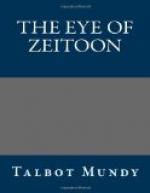“The nurse was right,” said the consul gloomily. “There’ll be murder enough hereabouts—and soon!”
He was a fairly young man yet in spite of the nearly white hair over the temples. He measured his words in the manner of a man whose speech is taken at face value.
“The missionaries know. The governments won’t listen. I’ve been appealed to. So has the United States consul, and neither of us is going to be able to do much. Remember, I represent a government at peace with Turkey, and so does he. The Turk has a side to his character that governments ignore. Have you watched them at prayer?”
We told him how close we had been on the previous night, and he laughed.
“Did you suppose I couldn’t smell camel and khan the moment you came in?”
“That was why Sister Vanderman hurried you off so promptly!” Fred announced with an air of outraged truthfulness. “Faugh! Slangy talk and stink of stables!”
“I was talking of Turks,” said the consul. “When they pray, you may have noticed that they glance to right and left. When they think there is nobody looking they do more, they stare deliberately to the right and left. That is the act of recognition of the angel and the devil who are supposed to attend every Moslem, the angel to record his good deeds and the devil his bad ones. To my mind there lies the secret of the Turk’s character. Most of the time he’s a man of his word—honest—courteous—considerate—good-humored —even chivalrous—living up to the angel. But once in so often he remembers the other shoulder, and then there isn’t any limit to the deviltry he’ll do. Absolutely not a limit!”
“I suppose we or the Americans could land marines at a pinch, and protect whoever asked for protection?” suggested Monty.
“No,” said the consul deliberately. “Germany would object. Germany is the only power that would. Germany would accuse us of scheming to destroy the value of their blessed Baghdad railway.”
A privy councilor of England, which Monty was, is not necessarily in touch with politics of any sort. Neither were we; but it happened that more than once in our wanderings about the world things had been forced on our attention.
“They would rather see Europe burn from end to end!” Monty agreed.
“And I think there’s more than that in it,” said the consul. “Armenians are not their favorites. The Germans want the trade of the Levant. The Armenians are business men. They’re shrewder than Jews and more dependable than Greeks. It would suit Germany very nicely, I imagine, to have no Armenians to compete with.”




